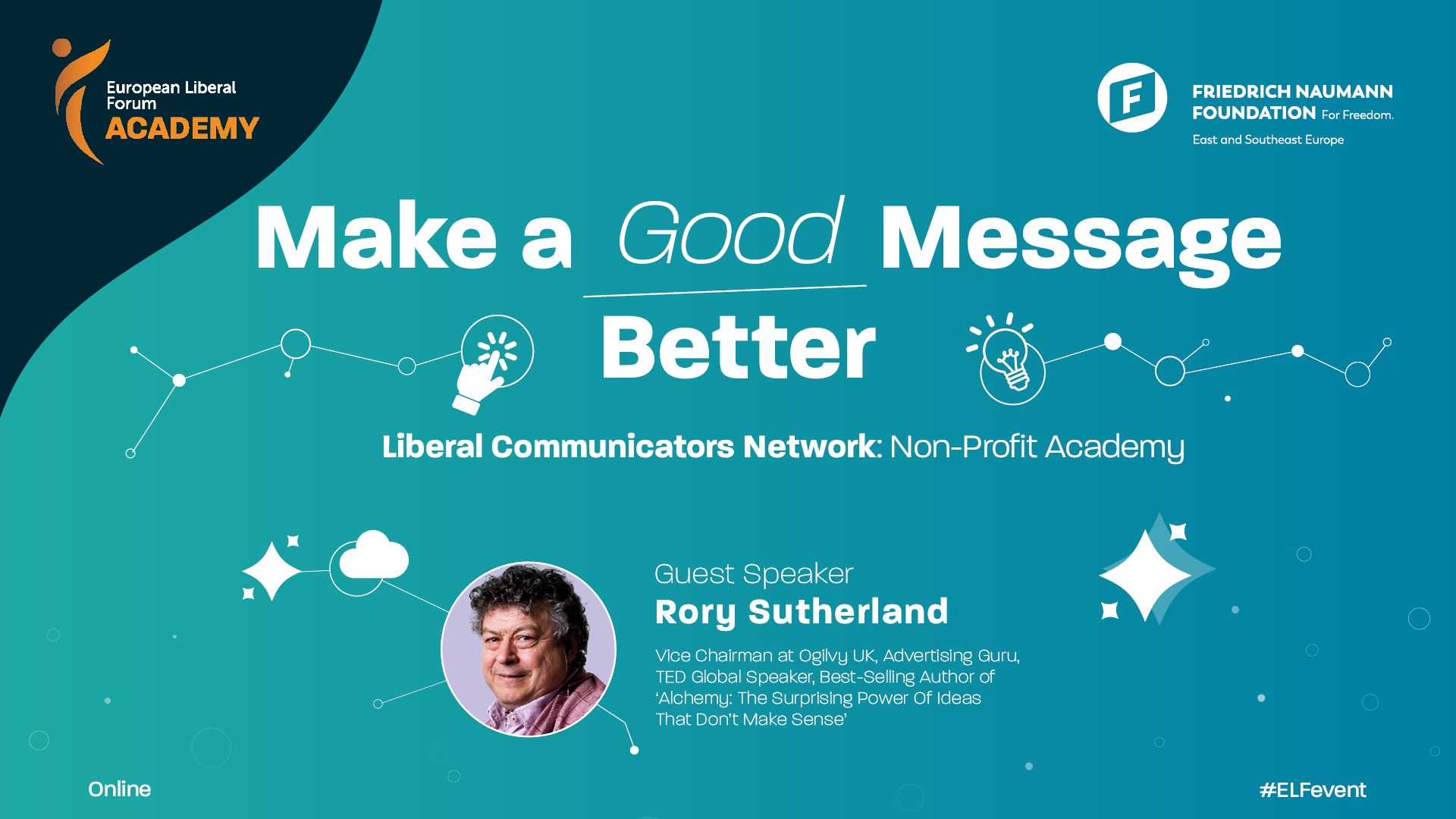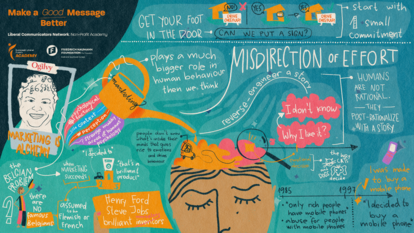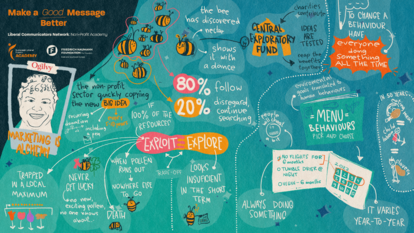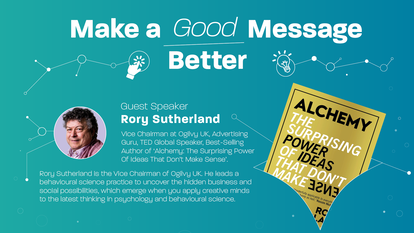Liberal Communicators Network
Rory Sutherland on Behavior Science and Creativity

Here are the top 5 theories of Rory Sutherland on behavior science and creativity, shared with liberal multipliers from East Europe. Don't miss the dose of inspiration and thought
provocation from the Vice Chairman, Ogilvy, UK; TED Global Speaker with millions of views and Best-Selling Author of “Alchemy”.
It has been an honor to have Rory as keynote speaker for 2 years in a row at the flagship communications training of the European Liberal Forum and FNF East and Southeast Europe - The Liberal Communicators Network (LCN): Non-Profit Academy. Thanks to Rory, the LCN participants embarked on an insightful learning journey with groundbreaking, counterintuitive and fascinating concepts.
Watch Rory's full keynote speech at LCN 2022
“The problem with Marketing is, when Marketing succeeds, you don't call it Marketing anymore”.
Marketing is invisible
Marketing is one of the leading factors in a product's success but when it succeeds, it is not counted as Marketing success, rather than the product's success. “There are brilliant ideas which failed, not because the technology was not there, not because the pricing is not right but because nobody has worked out fundamentally how to present them to us in a context or location or mood or a story that makes them sufficiently attractive.”
This goes back to the human perception of decision-making. “Nobody ever says when they are persuaded to do anything: I was persuaded to do something. They ignore the role of Marketing played in that behavior and they reverse engineer the thought process for themselves, which ends with the sentence: "I decided to!”.”
"Humans are post-rational species. It’s their emotions that drive their behavior."
Humans are not rational species, but rather the opposite. They have to create a backstory to a decision, in order to defend their decision in front of others. Humans are post-rational species. “It’s their emotions that drive their behavior”. Implementing this knowledge when trying to persuade the customer to, for example, purchase a car is to not only present them with the facts about the car but to trigger their emotions.

“Digital Marketing is too much about the exploit and too little about the explore”
Explore more, Exploit less
80% of bees follow the direction of their fellows when seeking the closest pollen. 20% of bees do not follow the direction but rather follow their own instincts, searching for new pollen sources. In the short run, it is more efficient to fully exploit the already found resource. In the long run, it is efficient to invest 20% into future resources and explore them.
“Digital Marketing because it measures short term returns, it is too much about the exploit and not enough about the explore. It is hunting for customers we already knew about, not trying to find the new which we never anticipated.”
Unfortunately in the non-profit sector most of the time there are not enough resources in the marketing departments. Therefore, it is not possible to invest in exploratory new marketing tactics and risky creative trials. If different non-profits would pool tiny amounts of money into a Central Exploratory Fund, they would be able to research and execute eccentric experiments together, while decreasing the financial risk.
“In theory charities are competitive with one another, but both want ultimately both to succeed. It is not a zero-sum game.”
With non-direct competitiveness, non-profits could share information about what worked in getting people's donations, customer loyalty, and in getting customer retention. If all charities contribute to the fund, ideas can be efficiently tested without any risk for a single charity. All non-profits would reap the benefits together.

Not everything works for everybody, give choices
“Don't ask everybody to do everything all of the time, ask everybody to do something some of the time.” is Sutherland’s main message when trying to persuade people to adopt a new habit. For instance when trying to convince citizens to use their tumble dryers at night to prevent an overload on the energy system.
One way to implement this habit is to instate a law, making it illegal to use the tumble dryer by day. Another way may be adapting prices, making it cheaper to use the tumble dryer at night. Both ways encounter obstructions, for instance, night shift workers not being able to monitor their tumble dryers, which could lead to a fire hazard or apartment complexes waking each other by the machines.
The main issue is “Legislation tries to get everybody to do everything all at once. Economic incentives force everybody regardless of their context to do something they might find difficult to do or else you punish them financially.”
“The great thing with persuasion is you don't need to do everything all at once, you just need to get people doing something all the time, it is a much more effective intervention.”
Implementing this theory means not forcing by law or finance people to do something, but giving them reasonable choices, and letting them be in control. In the tumble dryer example, an option may be to let people choose between different environment-saving commitments such as flying less or going vegan for a month instead of using your tumble dryer by night.
“Don't ask everybody to do everything all of the time, ask everybody to do something some of the time.”
The 10% hurdle
The first 10 percent of people to persuade are the hardest, the rest usually follows organically.
The best example is the rise of Veganism and Vegetarianism. With its population growing, more restaurants offer vegan and vegetarian options on its menus, which leads to a chain reaction of making veganism and vegetarianism more accessible. The more people follow a trend, the more it becomes socially acceptable and society will adapt to make it more accessible.
Small commitments make larger commitments easier to follow
When asking residents to put up a big sign in their lawn to drive carefully most residents declined. At the same time when asking residents to put up a small sign in their window first and later asking them to commit to an even bigger lawn sign residents agreed. Consequently, “if people make a small commitment they are more likely to commit to upgrade to a larger commitment.”
Graphic recording is done by '500 Markers' studio from Bulgaria.
If you are passionate about mission-driven communications and if you want to learn from thought leaders like Rory, apply for the Liberal Communicators Network. LCN Non-Profit Academy empowers liberal communicators to adapt cutting-edge communication strategies, innovation, and marketing trends for the specific context of the mission-driven sector. LCN strives to develop a professional European community of non-profit communicators from civil society organizations, foundations, think tanks, and change-makers, working on liberal issues. Stay tuned for the call of applications for LCN 2023.
Apply Now for LCN 2023
